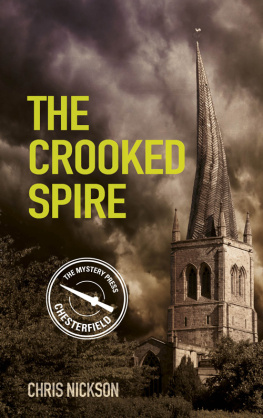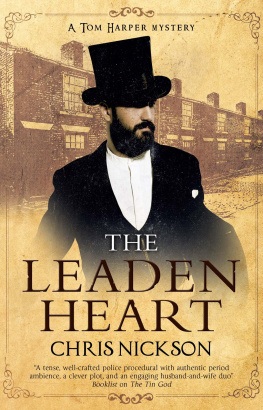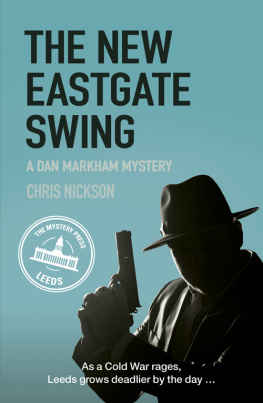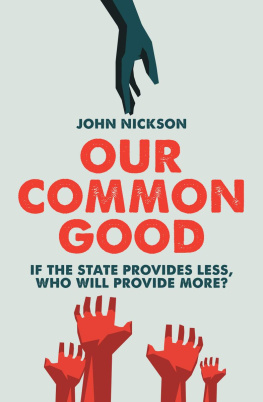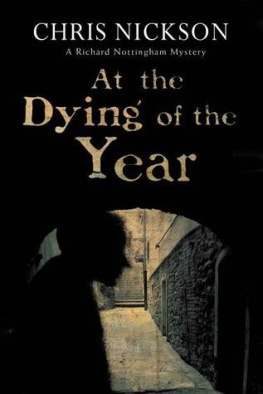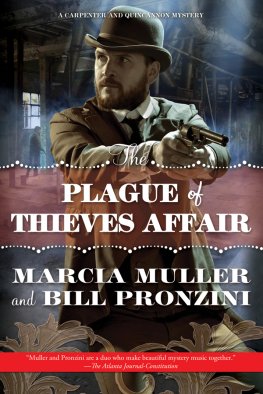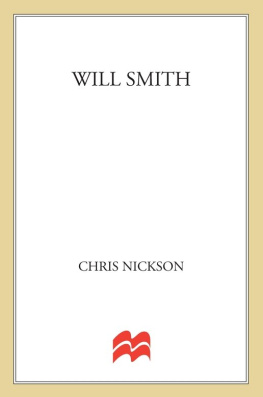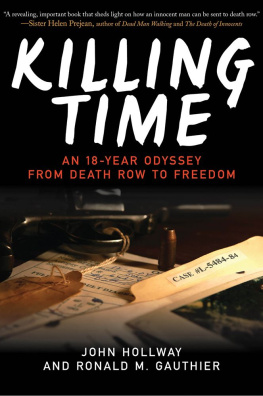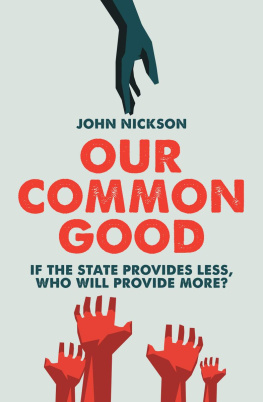
To Penny, because this is her favourite.
Contents
Anno Domini 1360
He came over the rise, the bag of tools weighing heavily on his shoulder. The track snaked away in front of him, down the slope, with the soft promise of water at the bottom of the valley. Over in the woods a magpie chattered to its mate as it swooped through the branches.
The August sun was already fierce, even though midday was still four hours away. He shaded his eyes with a hand and squinted. In the distance he could make out the low roofs and the church tower of Chesterfield. Another hour and he would be there, with a dry throat and a hunger the size of England. The chantry priest in Dronfield had let him sleep on a bench the night before, but the man had possessed precious little food to share.
He strode out, stopping to drink at the stream and wet his head then cross himself for luck before striking out along the road into the town. There were few people about, but that was no surprise. Coming down from York he had often gone half a day or more without seeing a soul, his tongue and his heart aching for conversation and companionship.
When he was a child, before the great pestilence came and swept away most of the world, he felt he remembered people everywhere, a welter of conversation that filled his ears all day. He had helped his father then, beginning to learn how to make the wood do what he wanted, shaping and shaving it. But then his father was gone; his life withered to nothing in two brief days, and all John had left was the mans satchel of tools and a mind that tumbled with memories and confusion.
He could recall the crops rotting in the fields at harvest time, not enough people still alive to bring them in, and the cows lowing until they died, their carcasses stinking and covered with flies.
He had taken to the roads that autumn, not wanting to cling to the few folk still alive in Leeds. He had the beginnings of a trade and it had served him well in the twelve years since. By Gods good grace he had a feel for wood. He could run his hands along the grain and understand how it should be, how to use its strength, where to cut and where to leave it.
A cart passed, going the other way, the horse plodding slowly between the traces, and he exchanged greetings with the driver, asking about the town ahead, eager for any gossip or information he could use. By the time they parted with a God be with you he had learned there was work for a good man building the spire for the church, and the names of two places where he might find food and ale. Smiling, he walked on into Chesterfield, easing his way up the hill that climbed towards the church.
He glanced around with a curious eye, taking in the marketplace close to the building, then the construction of the spire itself. Groups of men were at work, the masons up high on the scaffold, laughing and joking as they laboured away, joiners busy under the shade of trees in the yard; it seemed a good site, with everyone busy enough.
He passed through, taking a turn around the town. Houses were packed tight along the streets and there was a sense of money about the place. Not wealthy, perhaps, but a comfortable little market town, and a growing one at that. The rich iron tang of blood hung in the air in the crowded streets of the Shambles, where the animal carcasses were suspended and goodwives haggled loudly with butchers over the price and quality of meat.
A few yards further, where the ginnel ended, stood another market place, the largest he had seen, bigger even than the one in York. Astonished, he stood and gazed over the space, imagining it full of traders.
He was still wide-eyed when a high voice close by said, You need to see it tomorrow, and he turned quickly. The boy was no more than twelve or thirteen, not even any down on his chin yet, but he had a warm, guileless smile. His dark hair was awry around his face and he wore a cote of good cloth that was too short, as if the lad had grown too quickly.
The markets Tuesdays by the church, Saturdays here. People come from all over for it. Youre new here, arent you?
Aye, he agreed. The boy seemed harmless enough, but he still felt to make sure his purse was still attached to his belt. It looks like a fair town.
Wait until the morning, the lad inclined his head at the square, you wont believe it then. Youve never seen so many people, he said, his eyes wide, then nodded at the mans satchel. What do you do?
Im a carpenter, the man replied. I thought there might be work at the church.
Im sure there will be, the boy laughed. They always seem to want people there.
The answer didnt surprise him. The death had carried off so many skilled men that a craftsman could earn good money these days, before he moved on when he wanted, safe in the knowledge that there would be work ahead of him.
Ill go over there soon, he said.
Im Walter, the lad told him and cocked his head questioningly. Whats your name?
Im John.
Walter smiled happily and nodded once more. He started to leave, but then looked back.
Do you need somewhere to stay John?
I do, he replied. Do you know of a place?
Ask for Widow Martha on Knifesmithgate.
Thank you, Ill do that.
And with that Walter waved and ran off, moving across the empty marketplace with the effortless grace of the young.
John tried to pat the worst of the dirt and dust from his cote and hose, then made his way back to the church. He watched the workmen for a minute before asking one of the masons for the master carpenter.
Over there, the man pointed, staring at the stranger with open curiosity while he drank from a mug. They say hes not easy to work for.
John grinned.
Ill survive; Ive had hard masters before.
The master carpenter was bent over, planing down a length of oak, sawdust and small curls of wood caught in the sweat and hairs of his broad forearms. He was stripped to shirt and hose, the skin on the back of his neck red and angry.
What do you need? he asked without glancing up.
Im looking for work, John said.
You and a hundred others lad, the man answered.
Im a carpenter.
Oh aye? Where did you apprentice? He ran the plane along the beam again, then felt the surface delicately with his fingertips.
I started with my father in Leeds, John explained, then the sickness took him. Ive been on my own since then.
The man stood up and faced him, assessing him coolly. He was small but with the breadth and thick strength gained from a lifetime of labour, his short hair heavily flecked with grey, his lips clamped in a thin line.
Let me see your hands.
John held them out, palms upright to show the callouses of work.
Turn them over.
He did as he was ordered, displaying the many small scars that stood out on his skin.
Whats your name? the man asked.
John.
And where did you work last?
York. At the Minster.
Oh aye? The man said doubtfully and ran a hand across his chin. No shortage of jobs up there for them as is willing.
Could keep busy till Judgement Day, most likely, John agreed.
So why did you leave?
He reddened. A lasss father thought I ought to marry her. We had words.
Anyone hurt?
No. He shook his head. I left in the night on Lammas Eve. It was best to move on.
The man nodded then inclined his head at the satchel.
Let me see your tools.
John lifted the flap. The leather was old and scarred, and over the years he had mended the strap more times than he could count. But he had never been tempted to replace it. He remembered his father carrying it, the sound of it banging against his hip as he walked, looking down at his son and smiling.
Next page
